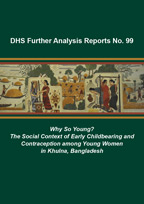- PUBLICATIONS
- JOURNAL ARTICLES
- ACCESS PUBLICATIONS
Publications Summary
- Document Type
- Further Analysis
- Publication Topic(s)
- Family Planning, Fertility and Fertility Preferences, Gender, Youth
- Country(s)
- Bangladesh
- Survey
- Bangladesh DHS, 2014
- Language
- English
- Recommended Citation
- MacQuarrie, Kerry L. D., Quamrun Nahar, Rasheda Khan, and Marzia Sultana. 2016. Why So Young? The Social Context of Early Childbearing and Contraception among Young Women in Khulna, Bangladesh. DHS Further Analysis Reports No. 99. Dhaka, Bangladesh and Rockville, Maryland, USA: National Institute of Population Research and Training (NIPORT), International Center for Diarrhoeal Disease Research, Bangladesh (icddr,b), and ICF International.
- Download Citation
- RIS format / Text format / Endnote format
- Publication Date
- March 2016
- Publication ID
- FA99
Download
 Why So Young? The Social Context of Early Childbearing and Contraception among Young Women in Khulna, Bangladesh (PDF, 1135K)
Why So Young? The Social Context of Early Childbearing and Contraception among Young Women in Khulna, Bangladesh (PDF, 1135K)
Download this publication
There is no printed copy available to order.
